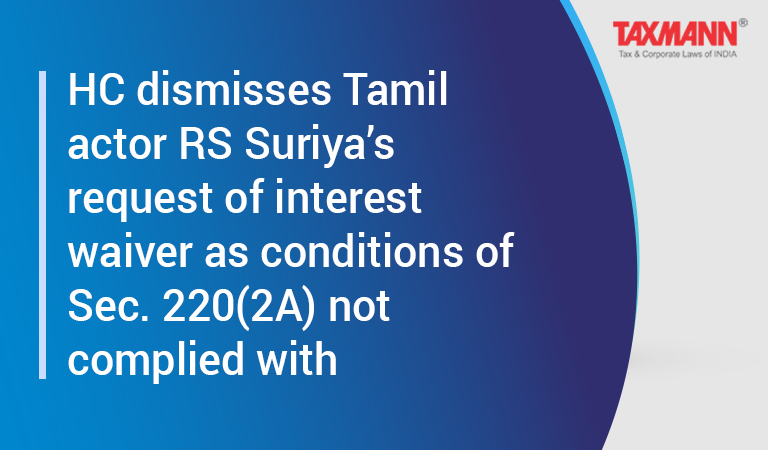HC dismisses Tamil actor RS Suriya’s request of interest waiver as conditions of Sec. 220(2A) not complied with
- Blog|News|Income Tax|
- 2 Min Read
- By Taxmann
- |
- Last Updated on 9 September, 2021

Case details: R.S.Suriya v. PCIT - [2021] 129 taxmann.com 345 (Madras)
Judiciary and Counsel Details
-
- S.M. Subramaniam, J.
- S. Raveekumar for the Petitioner.
- A.P. Srinivas, Sr. Standing Counsel for the Respondent.
Facts of the Case
Assessee-R.S. Suriya was a professional Cine Actor and regularly filing returns of income. Assessee filed an application for the purpose of grant of waiver of Interest through his authorized Chartered Accountants. Assessee stated that he had fully co-operated during the appellate proceedings and further provided all the necessary details as required by Assessing Officer (AO). Thus, he was eligible for the waiver of interest under section 220(2A).
However, revenue rejected assessee’s request for grant of interest waiver. Aggrieved-assessee filed the writ petition before the Madras High Court.
High Court held
The Madras High court held that interest charged under Section 220(2) is not a penalty but is compensation. Such compensatory interest is prescribed to make good the financial loss that occurred to the dept. on account of delay in payment on advance tax or tax on demand.
The PCCIT, CCIT, PCIT, or CIT may reduce or waive the amount of interest if he is satisfied with the three conditions stipulated in section 220(2A). The three conditions stipulated under section 220(2A) are:
1) Payment of such interest has caused or would cause genuine hardship to the assessee;
2) Default in the payment of the amount on which interest has been paid or was payable was due to circumstances beyond the control of the assessee; and
3) Assessee has co-operated in any inquiry relating to the assessment or any proceeding for the recovery of any amount due from him.
The above three conditions for waiver of interest are to be fulfilled cumulatively.
Keeping in mind the imperative conditions, it was found that the assessee had never paid the demands in time for both assessment years, i.e., 2007-08 and 2008-09.
Further, the observation made in the assessment order had revealed that the assessee had not furnished any reasons that default in the payment of interest was beyond the control of the assessee.
When the assessment proceedings for both the assessment years 2007-08 and 2009-10 were completed on 30.12.2011, it was not clear why the assessee had not paid these demands. At least the assessee would have paid these demands after giving effect to the CIT(A) dated 27.09.2013.
Furthermore, with regards to co-operation in assessment, it was found that consequent to search notice dated 09.03.2011 calling for the return of income within 45 days, assessee furnished return on 15.07.2011. The other incidents were also recorded to establish that the petitioner assessee had not cooperated for the completion of the Income-tax proceedings.
Thus, it can be concluded that the assessee had not established all the three conditions stipulated in the provisions for the purpose of grant of waiver of interest.
Disclaimer: The content/information published on the website is only for general information of the user and shall not be construed as legal advice. While the Taxmann has exercised reasonable efforts to ensure the veracity of information/content published, Taxmann shall be under no liability in any manner whatsoever for incorrect information, if any.

Taxmann Publications has a dedicated in-house Research & Editorial Team. This team consists of a team of Chartered Accountants, Company Secretaries, and Lawyers. This team works under the guidance and supervision of editor-in-chief Mr Rakesh Bhargava.
The Research and Editorial Team is responsible for developing reliable and accurate content for the readers. The team follows the six-sigma approach to achieve the benchmark of zero error in its publications and research platforms. The team ensures that the following publication guidelines are thoroughly followed while developing the content:
- The statutory material is obtained only from the authorized and reliable sources
- All the latest developments in the judicial and legislative fields are covered
- Prepare the analytical write-ups on current, controversial, and important issues to help the readers to understand the concept and its implications
- Every content published by Taxmann is complete, accurate and lucid
- All evidence-based statements are supported with proper reference to Section, Circular No., Notification No. or citations
- The golden rules of grammar, style and consistency are thoroughly followed
- Font and size that’s easy to read and remain consistent across all imprint and digital publications are applied



 CA | CS | CMA
CA | CS | CMA
